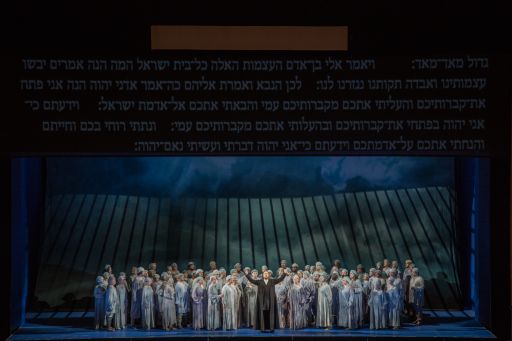Chicago, Lyric Opera of Chicago, 2015-2016 Season
“NABUCCO ”
Opera in four acts in Italian Libretto by Temistocle Solera, based on Antonio Cortesi’s ballet “Nabuccodonosor” and Auguste Anicet-Bourgeois’ and Francis Cornu’s play “Nabuchodonosor”.
Music by Giuseppe Verdi
Nabucco ZELJKO LUCIC
Abigaille TATIANA SERJAN
Zaccaria DMITRY BELOSSELSKIY
Fenena ELIZABETH DESHONG
Ismaele SERGEI SKOROKHODOV
High Priest of Baal STEFAN SZAKAFAROWSKY
Anna LAURA WILDE
Abdallo JESSE DONNER
Orchestra and Chorus of Lyric Opera of Chicago
Conductor Carlo Rizzi
Director Matthew Ozawa
Sets Michael Yeargan
Costumes Jane Greenwod
Lighting Duane Schuler
Chorus Master Michael Black
Stage Band Conductor Robert Tweten
Chicago, 23 January 2016
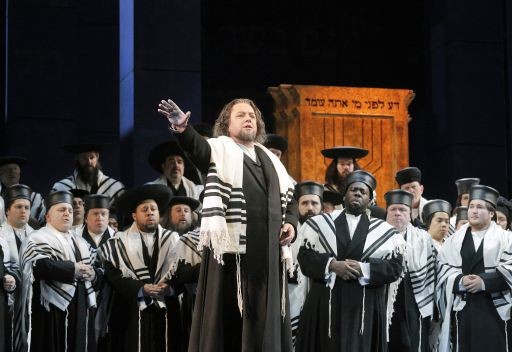 Many artists face a crisis of faith at some point in their development but few as crushing as that dealt the young Giuseppe Verdi in his still fledgling career. After the modest success of his first opera Oberto, Verdi turned to comedy with Un giorno di regno but this second piece was met with hostility at its first performance (the comic muse would not inspire Verdi again for another 60 years when he began work on Falstaff, his final offering for the stage). The composition of Un giorno di regno had been complicated by the death of Verdi’s two small children and to make matters worse, his wife Margherita also died while this opera was in preparation at La Scala. The cumulative impact of these personal tragedies seriously demoralized Verdi, whose paralyzing depression and resulting isolation might have relegated his name to that of a footnote in the annals of opera history.
Many artists face a crisis of faith at some point in their development but few as crushing as that dealt the young Giuseppe Verdi in his still fledgling career. After the modest success of his first opera Oberto, Verdi turned to comedy with Un giorno di regno but this second piece was met with hostility at its first performance (the comic muse would not inspire Verdi again for another 60 years when he began work on Falstaff, his final offering for the stage). The composition of Un giorno di regno had been complicated by the death of Verdi’s two small children and to make matters worse, his wife Margherita also died while this opera was in preparation at La Scala. The cumulative impact of these personal tragedies seriously demoralized Verdi, whose paralyzing depression and resulting isolation might have relegated his name to that of a footnote in the annals of opera history.But the insistent impresario of La Scala sensed unfulfilled greatness in Verdi and forced a libretto on him for consideration. Verdi recalled: “I threw the manuscript with a violent gesture on the table and stood rigid before it. Falling on the table, the manuscript opened itself and, without my quite realizing it, my eyes fixed on the page before me at this particular line: ‘Va, pensiero, sull’ali dorate.’” It would prove a fateful moment as these are the opening words of a chorus that linked the composer’s name inexorably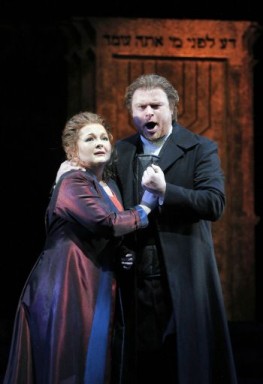 with the fate of his country. Its emotional and political resonances must have been overwhelming for the world premiere audience of Nabucco in 1842: Italy was under Austrian dominion and first hearers were stirred not only by the haunting melody but the obvious parallels between their own oppression by a foreign power and the depiction of subjugated Hebrews longing for their lost Jerusalem. Nabucco proved a decisive work for Verdi and Italian opera, establishing him as both the consciousness of and inspiration for a nation in search of a shared cultural identity. The success of Nabucco opened the pathway to Verdi’s destiny. He would go on to live as rich and full a life as any man could wish. His art served to unify a fragmented country and provided the stimulus to throw off the yoke of foreign rule. He took the torched passed to him by Rossini, Bellini and Donizetti and handed it to Puccini and the new generation of verismo composers. He worked in many of the major operatic capitals of Europe, including London, Vienna, Paris, St. Petersburg and, of course, La Scala. He was a tireless philanthropist and supporter of humanitarian causes. Above all, he was a man of the people, modest, humble and unassuming, who considered the Casa di Riposo, a retirement home for musicians still in operation today, his “greatest creation.” Verdi’s remains are now interred there and at his official state funeral in 1901, a crowd of 100,000 lined the streets of Milan to pay their respects. Legendary conductor Arturo Toscanini led a chorus in “Va, pensiero,” bringing to full circle a storied life and career that rose like the phoenix out of
with the fate of his country. Its emotional and political resonances must have been overwhelming for the world premiere audience of Nabucco in 1842: Italy was under Austrian dominion and first hearers were stirred not only by the haunting melody but the obvious parallels between their own oppression by a foreign power and the depiction of subjugated Hebrews longing for their lost Jerusalem. Nabucco proved a decisive work for Verdi and Italian opera, establishing him as both the consciousness of and inspiration for a nation in search of a shared cultural identity. The success of Nabucco opened the pathway to Verdi’s destiny. He would go on to live as rich and full a life as any man could wish. His art served to unify a fragmented country and provided the stimulus to throw off the yoke of foreign rule. He took the torched passed to him by Rossini, Bellini and Donizetti and handed it to Puccini and the new generation of verismo composers. He worked in many of the major operatic capitals of Europe, including London, Vienna, Paris, St. Petersburg and, of course, La Scala. He was a tireless philanthropist and supporter of humanitarian causes. Above all, he was a man of the people, modest, humble and unassuming, who considered the Casa di Riposo, a retirement home for musicians still in operation today, his “greatest creation.” Verdi’s remains are now interred there and at his official state funeral in 1901, a crowd of 100,000 lined the streets of Milan to pay their respects. Legendary conductor Arturo Toscanini led a chorus in “Va, pensiero,” bringing to full circle a storied life and career that rose like the phoenix out of 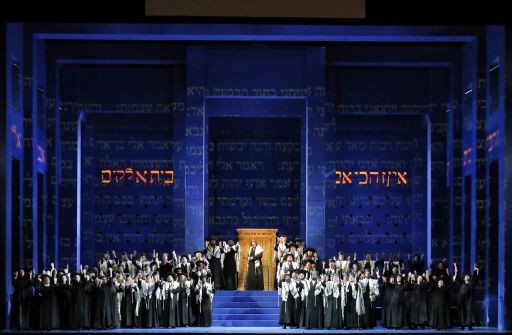 the ashes of personal and professional adversity.
the ashes of personal and professional adversity.
 with the fate of his country. Its emotional and political resonances must have been overwhelming for the world premiere audience of Nabucco in 1842: Italy was under Austrian dominion and first hearers were stirred not only by the haunting melody but the obvious parallels between their own oppression by a foreign power and the depiction of subjugated Hebrews longing for their lost Jerusalem. Nabucco proved a decisive work for Verdi and Italian opera, establishing him as both the consciousness of and inspiration for a nation in search of a shared cultural identity. The success of Nabucco opened the pathway to Verdi’s destiny. He would go on to live as rich and full a life as any man could wish. His art served to unify a fragmented country and provided the stimulus to throw off the yoke of foreign rule. He took the torched passed to him by Rossini, Bellini and Donizetti and handed it to Puccini and the new generation of verismo composers. He worked in many of the major operatic capitals of Europe, including London, Vienna, Paris, St. Petersburg and, of course, La Scala. He was a tireless philanthropist and supporter of humanitarian causes. Above all, he was a man of the people, modest, humble and unassuming, who considered the Casa di Riposo, a retirement home for musicians still in operation today, his “greatest creation.” Verdi’s remains are now interred there and at his official state funeral in 1901, a crowd of 100,000 lined the streets of Milan to pay their respects. Legendary conductor Arturo Toscanini led a chorus in “Va, pensiero,” bringing to full circle a storied life and career that rose like the phoenix out of
with the fate of his country. Its emotional and political resonances must have been overwhelming for the world premiere audience of Nabucco in 1842: Italy was under Austrian dominion and first hearers were stirred not only by the haunting melody but the obvious parallels between their own oppression by a foreign power and the depiction of subjugated Hebrews longing for their lost Jerusalem. Nabucco proved a decisive work for Verdi and Italian opera, establishing him as both the consciousness of and inspiration for a nation in search of a shared cultural identity. The success of Nabucco opened the pathway to Verdi’s destiny. He would go on to live as rich and full a life as any man could wish. His art served to unify a fragmented country and provided the stimulus to throw off the yoke of foreign rule. He took the torched passed to him by Rossini, Bellini and Donizetti and handed it to Puccini and the new generation of verismo composers. He worked in many of the major operatic capitals of Europe, including London, Vienna, Paris, St. Petersburg and, of course, La Scala. He was a tireless philanthropist and supporter of humanitarian causes. Above all, he was a man of the people, modest, humble and unassuming, who considered the Casa di Riposo, a retirement home for musicians still in operation today, his “greatest creation.” Verdi’s remains are now interred there and at his official state funeral in 1901, a crowd of 100,000 lined the streets of Milan to pay their respects. Legendary conductor Arturo Toscanini led a chorus in “Va, pensiero,” bringing to full circle a storied life and career that rose like the phoenix out of  the ashes of personal and professional adversity.
the ashes of personal and professional adversity.How did this metamorphosis occur? Something of its power can be understood in a National Geographic special where a lioness and her cubs make the sad mistake of sleeping near the nest of a cobra. The cobra, rendered blind while shedding its skin, inflicts a fatal bite on the cubs. The lioness is also bitten but endures days of agony and threat from other animals, hovering near death. She finally returns to her pride and resumes hunting duty, displaying an unforeseen ferocity during the kill, as if sublimating her immense grief and suffering into a new engagement with life. With its aggressive vigor and sweeping power, the overture of Nabucco exudes the same rekindled vitality, practically grabbing the listener by the lapel and proclaiming “I have returned!” Although each of the acts of Nabucco has a name, the opera itself lacks an ‘ossia’ or alternative title. With the benefit of hindsight, we might borrow the words and central theme of Charles Dickens in A Tale of Two Cities: “Recalled to Life.”
Lyric Opera of Chicago’s current production of Nabucco, like many Verdi performances today, was a hit 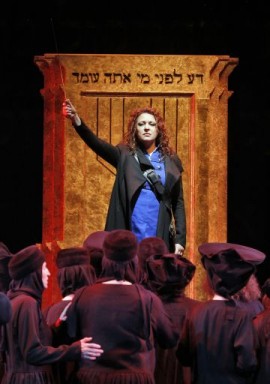 or miss affair, convincing as a totality but flawed in many of its elements. The laurel wreath was shared by soprano Tatiana Serjan and the Lyric Opera Chorus. In the impossibly demanding role of Abigaille, Serjan scored yet another triumph with her Chicago public, showing great fluency in the ‘canto d’azione’ of Verdi’s vocal writing (a style of singing notable for its forceful declamation, extremes of dynamics and wildly difficult acrobatics. An early exponent was Giuseppina Strepponi, the first interpreter of Abigaille and eventual wife of Verdi, who also furthered its practice through pedagogy she taught in Paris after the opera’s world premiere). Serjan’s old-school style, complete with glottal attacks and generous chest voice, was fondly appreciated by vocal connoisseurs familiar with the legacy of cult divas like Elena Suliotis and Leyla Gencer but it was the depth and integrity of her characterization that truly riveted attention. In a part known for campy excess, the soprano found a rare vulnerability and pathos, imbuing each of her scenes with dignity and serious intention. With its uneven registers, Serjan’s voice was not all of a piece and it must be said that her fluttery top register, arrived at through jarring gear shifts into head resonance, was sometimes underpowered. But she possessed the essential quality of fearlessness necessary to do battle with the material and received a rapturous ovation from the audience for her efforts. The chorus also won the audience’s approval for its full-throated, robust contributions but was also capable of hushed eloquence and subtlety in the famous “Va pensiero.” Chorus Master Michael Black took a featured role during the final bows and this was entirely
or miss affair, convincing as a totality but flawed in many of its elements. The laurel wreath was shared by soprano Tatiana Serjan and the Lyric Opera Chorus. In the impossibly demanding role of Abigaille, Serjan scored yet another triumph with her Chicago public, showing great fluency in the ‘canto d’azione’ of Verdi’s vocal writing (a style of singing notable for its forceful declamation, extremes of dynamics and wildly difficult acrobatics. An early exponent was Giuseppina Strepponi, the first interpreter of Abigaille and eventual wife of Verdi, who also furthered its practice through pedagogy she taught in Paris after the opera’s world premiere). Serjan’s old-school style, complete with glottal attacks and generous chest voice, was fondly appreciated by vocal connoisseurs familiar with the legacy of cult divas like Elena Suliotis and Leyla Gencer but it was the depth and integrity of her characterization that truly riveted attention. In a part known for campy excess, the soprano found a rare vulnerability and pathos, imbuing each of her scenes with dignity and serious intention. With its uneven registers, Serjan’s voice was not all of a piece and it must be said that her fluttery top register, arrived at through jarring gear shifts into head resonance, was sometimes underpowered. But she possessed the essential quality of fearlessness necessary to do battle with the material and received a rapturous ovation from the audience for her efforts. The chorus also won the audience’s approval for its full-throated, robust contributions but was also capable of hushed eloquence and subtlety in the famous “Va pensiero.” Chorus Master Michael Black took a featured role during the final bows and this was entirely 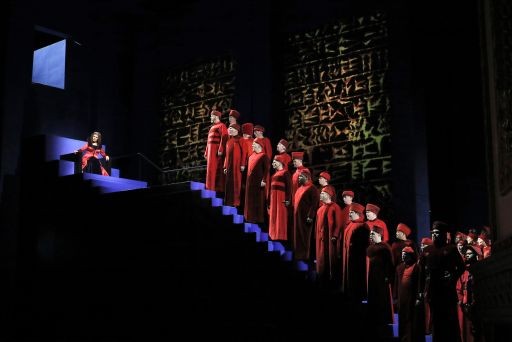 appropriate. The opera stands or falls by the unison work of the chorus; Lyric’s ensemble, soaring, sonorous and well blended in sound, demonstrated the strength of his leadership. In the title role, Zeljko Lucic proved far more problematic. While never evoking Golden Age associations with Tito Ruffo, Leonard Warren or Ettore Bastianini, Lucic does possess a sturdy, warm baritone equal to the role’s requirements. But what a dull, uninspiring performer he proved yet again! His portrayal lacked any vestige of dramatic stature, unconvincing as either arrogant tyrant or humbled madman. Lucic shuffled into his every scene with a casual physicality and slumped appearance befitting a tired businessman at the end of a difficult sales meeting, not a regal personage in extremis. Lucic was a black hole of theatrical inertia, draining the life and momentum from every scene in which he appeared. This was a sad case of an artist coasting on vocal competency in a debased age of Verdi singing, where any reasonably well-sung outcome is mistaken for true catharsis. In contrast to Serjan’s blazing, “take no prisoners” approach to her role, Lucic seemed embarrassed or intimidated by the outsized manner of 19th century melodrama. As Zaccaria, Dmitry Belosselsskiy left a more positive impression. He displayed a good legato and a strong, buzzing sound in the middle register. On the debit side, his lower register sometimes disintegrated into inaudibility and for a remarkably tall performer, Belosselsskiy showed little real command of the stage or ability to take focus with the dramatic situation. The secondary couple was in good hands: Elizabeth DeShong’s velvet-toned, exquisitely phrased Fenena
appropriate. The opera stands or falls by the unison work of the chorus; Lyric’s ensemble, soaring, sonorous and well blended in sound, demonstrated the strength of his leadership. In the title role, Zeljko Lucic proved far more problematic. While never evoking Golden Age associations with Tito Ruffo, Leonard Warren or Ettore Bastianini, Lucic does possess a sturdy, warm baritone equal to the role’s requirements. But what a dull, uninspiring performer he proved yet again! His portrayal lacked any vestige of dramatic stature, unconvincing as either arrogant tyrant or humbled madman. Lucic shuffled into his every scene with a casual physicality and slumped appearance befitting a tired businessman at the end of a difficult sales meeting, not a regal personage in extremis. Lucic was a black hole of theatrical inertia, draining the life and momentum from every scene in which he appeared. This was a sad case of an artist coasting on vocal competency in a debased age of Verdi singing, where any reasonably well-sung outcome is mistaken for true catharsis. In contrast to Serjan’s blazing, “take no prisoners” approach to her role, Lucic seemed embarrassed or intimidated by the outsized manner of 19th century melodrama. As Zaccaria, Dmitry Belosselsskiy left a more positive impression. He displayed a good legato and a strong, buzzing sound in the middle register. On the debit side, his lower register sometimes disintegrated into inaudibility and for a remarkably tall performer, Belosselsskiy showed little real command of the stage or ability to take focus with the dramatic situation. The secondary couple was in good hands: Elizabeth DeShong’s velvet-toned, exquisitely phrased Fenena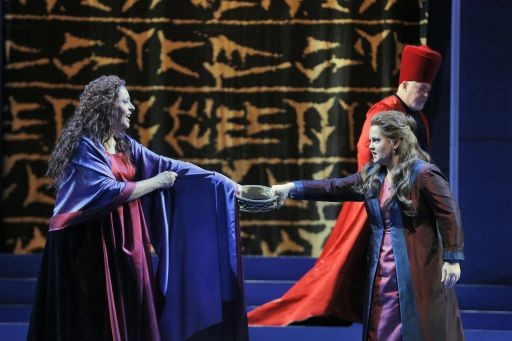 boded well for her future outings with the company next season as Adalgisa, while Sergei Skorokhodov’s Ismaele gave pleasure with his compact but attractive spinto tenor. Stefan Szkafarowsky appeared awkward in voice and presence as the High Priest of Baal, while Laura Wilde and Jesse Donner rounded out the cast with distinction. The performance’s primary liability was Carlo Rizzi’s frustrating conducting, mannered in tempo and fussy in execution. His leadership registered as a calculated series of effects, including an overreliance on artificial and exaggerated rubati, which served only to defuse the inherent tension of Verdi’s writing. In contrast, Stage Band Conductor Robert Tweten commendably blended the numerous offstage ‘bandas’ into a seamless sonic picture. Lyric Opera’s production was originally staged by Elijah Moshinsky for the company in 1997 but his name was curiously missing from the production
boded well for her future outings with the company next season as Adalgisa, while Sergei Skorokhodov’s Ismaele gave pleasure with his compact but attractive spinto tenor. Stefan Szkafarowsky appeared awkward in voice and presence as the High Priest of Baal, while Laura Wilde and Jesse Donner rounded out the cast with distinction. The performance’s primary liability was Carlo Rizzi’s frustrating conducting, mannered in tempo and fussy in execution. His leadership registered as a calculated series of effects, including an overreliance on artificial and exaggerated rubati, which served only to defuse the inherent tension of Verdi’s writing. In contrast, Stage Band Conductor Robert Tweten commendably blended the numerous offstage ‘bandas’ into a seamless sonic picture. Lyric Opera’s production was originally staged by Elijah Moshinsky for the company in 1997 but his name was curiously missing from the production 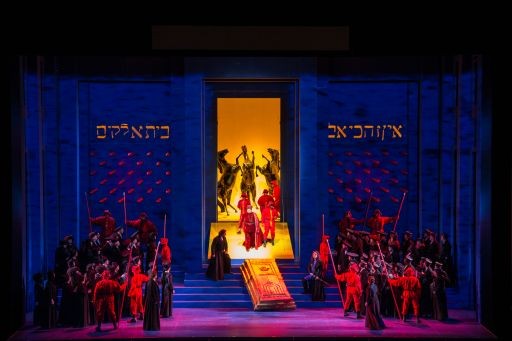 credits. Perhaps he no longer wishes to be associated with a staging that now looks cheap and dated. Matthew Ozawa’s stage direction is standard cookbook revival and looks particularly shoddy in Michael Yeargan’s sets and Jane Greenwood’s costumes, all of which resemble “timeless” designs from the original STAR TREK series–and third-season tackiness at that. The soloists were left to their own devices while the chorus marched on and stood dutifully in place, blank of face and devoid of any communicative expression that might heighten the dramatic narrative. The assembly of Nabucco’s soldiers in the penultimate scene was particularly risible, with a robotic, wooden lineup worthy of an amateur Gilbert and Sullivan society. Even so, Lyric Opera’s Nabucco proved greater than the sum of its parts and illuminated once again why the work remains a seminal part of operatic history, as well as its redemptive function for Verdi the composer and man “recalled to life.”Photo Andrew Cioffi & Cory Weaver
credits. Perhaps he no longer wishes to be associated with a staging that now looks cheap and dated. Matthew Ozawa’s stage direction is standard cookbook revival and looks particularly shoddy in Michael Yeargan’s sets and Jane Greenwood’s costumes, all of which resemble “timeless” designs from the original STAR TREK series–and third-season tackiness at that. The soloists were left to their own devices while the chorus marched on and stood dutifully in place, blank of face and devoid of any communicative expression that might heighten the dramatic narrative. The assembly of Nabucco’s soldiers in the penultimate scene was particularly risible, with a robotic, wooden lineup worthy of an amateur Gilbert and Sullivan society. Even so, Lyric Opera’s Nabucco proved greater than the sum of its parts and illuminated once again why the work remains a seminal part of operatic history, as well as its redemptive function for Verdi the composer and man “recalled to life.”Photo Andrew Cioffi & Cory Weaver
 or miss affair, convincing as a totality but flawed in many of its elements. The laurel wreath was shared by soprano Tatiana Serjan and the Lyric Opera Chorus. In the impossibly demanding role of Abigaille, Serjan scored yet another triumph with her Chicago public, showing great fluency in the ‘canto d’azione’ of Verdi’s vocal writing (a style of singing notable for its forceful declamation, extremes of dynamics and wildly difficult acrobatics. An early exponent was Giuseppina Strepponi, the first interpreter of Abigaille and eventual wife of Verdi, who also furthered its practice through pedagogy she taught in Paris after the opera’s world premiere). Serjan’s old-school style, complete with glottal attacks and generous chest voice, was fondly appreciated by vocal connoisseurs familiar with the legacy of cult divas like Elena Suliotis and Leyla Gencer but it was the depth and integrity of her characterization that truly riveted attention. In a part known for campy excess, the soprano found a rare vulnerability and pathos, imbuing each of her scenes with dignity and serious intention. With its uneven registers, Serjan’s voice was not all of a piece and it must be said that her fluttery top register, arrived at through jarring gear shifts into head resonance, was sometimes underpowered. But she possessed the essential quality of fearlessness necessary to do battle with the material and received a rapturous ovation from the audience for her efforts. The chorus also won the audience’s approval for its full-throated, robust contributions but was also capable of hushed eloquence and subtlety in the famous “Va pensiero.” Chorus Master Michael Black took a featured role during the final bows and this was entirely
or miss affair, convincing as a totality but flawed in many of its elements. The laurel wreath was shared by soprano Tatiana Serjan and the Lyric Opera Chorus. In the impossibly demanding role of Abigaille, Serjan scored yet another triumph with her Chicago public, showing great fluency in the ‘canto d’azione’ of Verdi’s vocal writing (a style of singing notable for its forceful declamation, extremes of dynamics and wildly difficult acrobatics. An early exponent was Giuseppina Strepponi, the first interpreter of Abigaille and eventual wife of Verdi, who also furthered its practice through pedagogy she taught in Paris after the opera’s world premiere). Serjan’s old-school style, complete with glottal attacks and generous chest voice, was fondly appreciated by vocal connoisseurs familiar with the legacy of cult divas like Elena Suliotis and Leyla Gencer but it was the depth and integrity of her characterization that truly riveted attention. In a part known for campy excess, the soprano found a rare vulnerability and pathos, imbuing each of her scenes with dignity and serious intention. With its uneven registers, Serjan’s voice was not all of a piece and it must be said that her fluttery top register, arrived at through jarring gear shifts into head resonance, was sometimes underpowered. But she possessed the essential quality of fearlessness necessary to do battle with the material and received a rapturous ovation from the audience for her efforts. The chorus also won the audience’s approval for its full-throated, robust contributions but was also capable of hushed eloquence and subtlety in the famous “Va pensiero.” Chorus Master Michael Black took a featured role during the final bows and this was entirely  appropriate. The opera stands or falls by the unison work of the chorus; Lyric’s ensemble, soaring, sonorous and well blended in sound, demonstrated the strength of his leadership. In the title role, Zeljko Lucic proved far more problematic. While never evoking Golden Age associations with Tito Ruffo, Leonard Warren or Ettore Bastianini, Lucic does possess a sturdy, warm baritone equal to the role’s requirements. But what a dull, uninspiring performer he proved yet again! His portrayal lacked any vestige of dramatic stature, unconvincing as either arrogant tyrant or humbled madman. Lucic shuffled into his every scene with a casual physicality and slumped appearance befitting a tired businessman at the end of a difficult sales meeting, not a regal personage in extremis. Lucic was a black hole of theatrical inertia, draining the life and momentum from every scene in which he appeared. This was a sad case of an artist coasting on vocal competency in a debased age of Verdi singing, where any reasonably well-sung outcome is mistaken for true catharsis. In contrast to Serjan’s blazing, “take no prisoners” approach to her role, Lucic seemed embarrassed or intimidated by the outsized manner of 19th century melodrama. As Zaccaria, Dmitry Belosselsskiy left a more positive impression. He displayed a good legato and a strong, buzzing sound in the middle register. On the debit side, his lower register sometimes disintegrated into inaudibility and for a remarkably tall performer, Belosselsskiy showed little real command of the stage or ability to take focus with the dramatic situation. The secondary couple was in good hands: Elizabeth DeShong’s velvet-toned, exquisitely phrased Fenena
appropriate. The opera stands or falls by the unison work of the chorus; Lyric’s ensemble, soaring, sonorous and well blended in sound, demonstrated the strength of his leadership. In the title role, Zeljko Lucic proved far more problematic. While never evoking Golden Age associations with Tito Ruffo, Leonard Warren or Ettore Bastianini, Lucic does possess a sturdy, warm baritone equal to the role’s requirements. But what a dull, uninspiring performer he proved yet again! His portrayal lacked any vestige of dramatic stature, unconvincing as either arrogant tyrant or humbled madman. Lucic shuffled into his every scene with a casual physicality and slumped appearance befitting a tired businessman at the end of a difficult sales meeting, not a regal personage in extremis. Lucic was a black hole of theatrical inertia, draining the life and momentum from every scene in which he appeared. This was a sad case of an artist coasting on vocal competency in a debased age of Verdi singing, where any reasonably well-sung outcome is mistaken for true catharsis. In contrast to Serjan’s blazing, “take no prisoners” approach to her role, Lucic seemed embarrassed or intimidated by the outsized manner of 19th century melodrama. As Zaccaria, Dmitry Belosselsskiy left a more positive impression. He displayed a good legato and a strong, buzzing sound in the middle register. On the debit side, his lower register sometimes disintegrated into inaudibility and for a remarkably tall performer, Belosselsskiy showed little real command of the stage or ability to take focus with the dramatic situation. The secondary couple was in good hands: Elizabeth DeShong’s velvet-toned, exquisitely phrased Fenena boded well for her future outings with the company next season as Adalgisa, while Sergei Skorokhodov’s Ismaele gave pleasure with his compact but attractive spinto tenor. Stefan Szkafarowsky appeared awkward in voice and presence as the High Priest of Baal, while Laura Wilde and Jesse Donner rounded out the cast with distinction. The performance’s primary liability was Carlo Rizzi’s frustrating conducting, mannered in tempo and fussy in execution. His leadership registered as a calculated series of effects, including an overreliance on artificial and exaggerated rubati, which served only to defuse the inherent tension of Verdi’s writing. In contrast, Stage Band Conductor Robert Tweten commendably blended the numerous offstage ‘bandas’ into a seamless sonic picture. Lyric Opera’s production was originally staged by Elijah Moshinsky for the company in 1997 but his name was curiously missing from the production
boded well for her future outings with the company next season as Adalgisa, while Sergei Skorokhodov’s Ismaele gave pleasure with his compact but attractive spinto tenor. Stefan Szkafarowsky appeared awkward in voice and presence as the High Priest of Baal, while Laura Wilde and Jesse Donner rounded out the cast with distinction. The performance’s primary liability was Carlo Rizzi’s frustrating conducting, mannered in tempo and fussy in execution. His leadership registered as a calculated series of effects, including an overreliance on artificial and exaggerated rubati, which served only to defuse the inherent tension of Verdi’s writing. In contrast, Stage Band Conductor Robert Tweten commendably blended the numerous offstage ‘bandas’ into a seamless sonic picture. Lyric Opera’s production was originally staged by Elijah Moshinsky for the company in 1997 but his name was curiously missing from the production  credits. Perhaps he no longer wishes to be associated with a staging that now looks cheap and dated. Matthew Ozawa’s stage direction is standard cookbook revival and looks particularly shoddy in Michael Yeargan’s sets and Jane Greenwood’s costumes, all of which resemble “timeless” designs from the original STAR TREK series–and third-season tackiness at that. The soloists were left to their own devices while the chorus marched on and stood dutifully in place, blank of face and devoid of any communicative expression that might heighten the dramatic narrative. The assembly of Nabucco’s soldiers in the penultimate scene was particularly risible, with a robotic, wooden lineup worthy of an amateur Gilbert and Sullivan society. Even so, Lyric Opera’s Nabucco proved greater than the sum of its parts and illuminated once again why the work remains a seminal part of operatic history, as well as its redemptive function for Verdi the composer and man “recalled to life.”Photo Andrew Cioffi & Cory Weaver
credits. Perhaps he no longer wishes to be associated with a staging that now looks cheap and dated. Matthew Ozawa’s stage direction is standard cookbook revival and looks particularly shoddy in Michael Yeargan’s sets and Jane Greenwood’s costumes, all of which resemble “timeless” designs from the original STAR TREK series–and third-season tackiness at that. The soloists were left to their own devices while the chorus marched on and stood dutifully in place, blank of face and devoid of any communicative expression that might heighten the dramatic narrative. The assembly of Nabucco’s soldiers in the penultimate scene was particularly risible, with a robotic, wooden lineup worthy of an amateur Gilbert and Sullivan society. Even so, Lyric Opera’s Nabucco proved greater than the sum of its parts and illuminated once again why the work remains a seminal part of operatic history, as well as its redemptive function for Verdi the composer and man “recalled to life.”Photo Andrew Cioffi & Cory Weaver